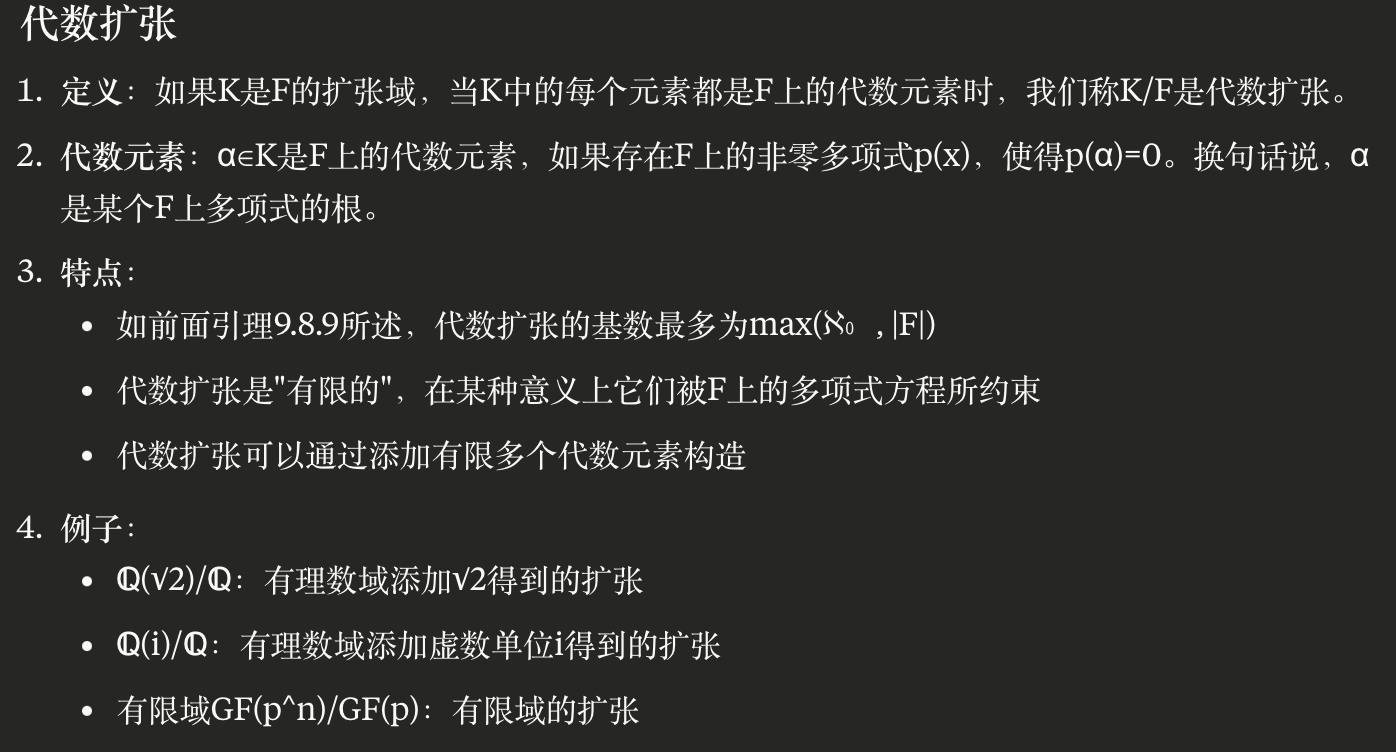Recently, I’ve read some papers about the Elliptic Curve and found a general primitive - abelian variety. And when I was reading the paper, I found that the author mentioned the algebraic closure of a field, which I had not learned before. I want to write a blog to introduce this concept.
Algebraically Closed Fields
Proposition 1. Let $E$ be a field. We say that $E$ is algebraically closed if all non-constant polynomials in $E[x]$ have a root.
Proposition 2. A field $F$ is said to be algebraically closed if every algebraic extension $E / F$ is trivial, i.e., $E=F$.
Theorem 1. Let $F$ be a field. The following are equivalent
(1) $F$ is algebraically closed,
(2) every irreducible polynomial over $F$ is linear,
(3) every nonconstant polynomial over $F$ has a root,
(4) every nonconstant polynomial over $F$ is a product of linear factors.
Proof. Proof. If $F$ is algebraically closed, then every irreducible polynomial is linear. Namely, if there exists an irreducible polynomial of degree $>1$, then this generates a nontrivial finite (hence algebraic) field extension, see Example 9.7.6. Thus (1) implies (2). If every irreducible polynomial is linear, then every irreducible polynomial has a root, whence every nonconstant polynomial has a root. Thus (2) implies (3).
Assume every nonconstant polynomial has a root. Let $P \in F[x]$ be nonconstant. If $P(\alpha)=0$ with $\alpha \in F$, then we see that $P=(x-\alpha) Q$ for some $Q \in F[x]$ (by division with remainder). Thus we can argue by induction on the degree that any nonconstant polynomial can be written as a product $c \prod\left(x-\alpha_i\right)$.
Finally, suppose that every nonconstant polynomial over $F$ is a product of linear factors. Let $E / F$ be an algebraic extension. Then all the simple subextensions $F(\alpha) / F$ of $E$ are necessarily trivial (because the only irreducible polynomials are linear by assumption). Thus $E=F$. We see that (4) implies (1) and we are done.
Now we want to define a “universal” algebraic extension of a field. Actually, we should be careful: the algebraic closure is not a universal object. That is, the algebraic closure is not unique up to unique isomorphism: it is only unique up to isomorphism. But still, it will be very handy, if not functorial.
Algebraically Closure
Definition 1. Let $F$ be a field. An algebraic closure of $F$ is a field $\bar{F}$ containing $F$ such that:
(1) $\bar{F}$ is algebraic over $F$.
(2) $\bar{F}$ is algebraically closed.
If $F$ is algebraically closed, then $F$ is its own algebraic closure. We now prove the basic existence result.
Theorem 2. Every field has an algebraic closure.
Proof. Let $F$ be a field. Let $\mathcal{X}$ be the set of all algebraic extensions of $F$.
Clearly, $F \in \mathcal{X} \neq \emptyset$.
Let $C$ be a chain in $\mathcal{X}$. Let
As $E$ is a union of ascending fields, it is clear that $E$ is itself a field.
We claim $E$ is an algebraic extension of $F$. Clearly, $F \subseteq E$ since every field in $C \neq \emptyset$ contains $F$. Let $\alpha \in E$. Then there exists some field $F^{\prime} \in C$ such that $\alpha \in F^{\prime}$. As $F^{\prime} / F$ is algebraic, we see that $\alpha$ is algebraic over $F$. Thus, $E / F$ is algebraic, that is, $E \in \mathcal{X}$.
As $F^{\prime} \subseteq E$ for all $F^{\prime} \in C$, every chain in $\mathcal{X}$ has an upper bound.
By Zorn’s Lemma, $\mathcal{X}$ has a maximal element, $\bar{F}$ Thus, $F^{\prime}$ is an algebraic closure of $F$, being a maximal algebraic extension.
Zorn’s Lemma. Let $P$ be a partially ordered set. If every chain in $P$ has an upper bound, then $P$ has a maximal element.
Lemma 1. Let $F$ be a field. Then $E$ is an algebraic closure of $F$ if and only if $E$ is a maximal algebraic extension of $F$.
Lemma 2. Let $E / F$ be an algebraic extension of fields. Then the cardinality $|E|$ of $E$ is at most $\max \left(\aleph_0,|F|\right)$.
Proof. Let $S$ be the set of nonconstant polynomials with coefficients in $F$. For every $P \in S$ the set of roots $r(P, E)=\{\alpha \in E \mid P(\alpha)=0\}$ is finite (details omitted). Moreover, the fact that $E$ is algebraic over $F$ implies that $E=\bigcup_{P \in S} r(P, E)$. It is clear that $S$ has cardinality bounded by $\max \left(\aleph_0,|F|\right)$ because it is a countable union of finite products of copies of $F$. Thus so does $E$.
When I saw lemma2, I was confused. As everyone knows, the cardinality of the extension of fields must be larger than the base field. I finally realized that I hadn’t noticed “at most” and “max.”
Then I thought about transcendental extensions and algebraic extensions.


References
[1] https://en.wikipedia.org/wiki/Algebraic_closure
[2] https://en.wikipedia.org/wiki/Field_extension
[3] https://www.youtube.com/watch?v=y9358yg9SmQ
[4] https://www.youtube.com/watch?v=lN_c7KlKPlA
[5] https://stacks.math.columbia.edu/tag/09GK